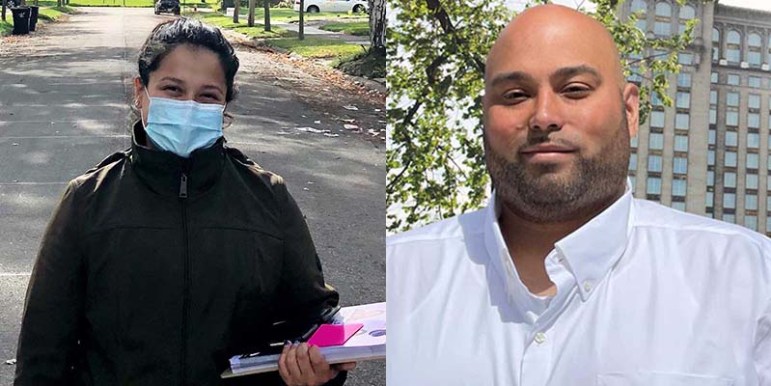
Detroit City Council will have at least four new members after the Nov. 2 election, due to two incumbents declining to seek re-election and two being forced to resign after being convicted of taking bribes.
Related:
- Election takeaways and a preview of the next Detroit City Council
- Corruption investigations spread to two more Detroit City Council members
There is at least one certainty: The tradition of a Latinx council member will continue in what’s often called the city’s most diverse Council district. District 6 includes the Southwest, parts of Midtown, downtown, Corktown, Delray and Woodbridge, and at least a dozen other neighborhoods.
The area is the heart of Detroit’s Latinx community. There’s a longtime Middle Eastern presence and, of course, African American and white. District 6 includes the increasingly affluent Corktown and parts of downtown and Midtown. On the southernmost edge of the district are communities that deal with the environmental health hazards brought on by nearby steel mills, coal-fired power plants, a salt mine, wastewater treatment plant, and one of the nation’s largest oil refineries.
Since 2013, the district has been represented by Raquel Castañeda-López. She was the first Latina elected to the council. It was also the first election to include council members that represented seven districts. Two other council members are selected in at-large races.
Castañeda-López is not seeking another term. The two candidates vying for her seat are Gabriela Santiago-Romero and Hector Santiago. Both have never held office before. Both have strong community activist roots in the district. Both candidates stressed the importance of representing everyone.
“I know people like to think District 6 is just Latinx, but that’s not at all the case,” said Santiago-Romero. “It’s diverse incomes and diverse backgrounds. But the basic asks that I hear across-the-board is that people want a functioning city, especially with the high taxes we pay. They want the streetlights to work, they want the police to show up when you call them, they want sidewalks in their neighborhood, they want the removal of blight.”
Her top priorities are to improve basic City services, create a City department of environmental oversight that will keep track of the many heavy industrial operations in the district, and address growing housing needs, which include both more affordable housing and more home repair funds.

Santiago agreed about the need to reach out beyond the district’s Latinx base. “We got eight different ZIP codes in the district. In some places, there’s the feeling of being left behind and not being heard,” Santiago said. In other neighborhoods experiencing growth, there’s concerns about parking and how the city will handle future development, he said.
His top priorities include adding more youth programs that seek to curb gang violence and drug use — he cited the D.A.R.E program as an example, more monitoring for the care of senior citizens and more investment in recidivism programs.
Many residents said the candidates’ ethnicity and race didn’t matter.
“It’s not important to me, really, that (the candidates) be Latino or Latina, and I’m a Latina,” said Elizabeth Valdez, president of the Detroit Southwest Pride neighborhood group. “What matters is that they are out there listening to us and our needs.” Valdez was among those who praised Castañeda-López and her staff for their community outreach efforts. “She was one of the best,” Valdez said. “I feel like she knocked on just about every door in Southwest Detroit. She fought for the people. We need that kind of representation.” Valdez cited public safety, housing and support for undocumented famiies as her top concerns.
Ethelyn Carroll of the United Block Club Council also praised Castañeda-López.
“I’m certainly OK with having a Latina council member because there is a large community here. What’s really important is (that) she and her staff always attended our meetings and reached out to us. That’s what needs to continue,” Carroll said. Carroll lives in an area with many longtime Black residents like herself. She cited public safety, expanding the funds available for middle-class Detroiters for home repairs, and more protection from future flooding as some of her top concerns.
Santiago-Romero has received the endorsement of Castaneda-Lopez and other progressives that have strong backing in Southwest. That includes U.S Rep. Rashida Tlaib, Michigan State Rep. Stephanie Chang. Other endorsements include Detroit Councilmember Mary Sheffield, Mayor Mike Duggan and Michigan state Rep. Abraham Aiyash.
Since late 2019, she has been the policy and research director for We The People Michigan, an advocacy and organizing group that conducts voter canvassing and supports issues such as race-based reparations and a universal income.
Santiago is the son of two pastors. For nearly a decade, he led a workforce development program for The Greening of Detroit, a nonprofit focused on promoting green infrastructure. He is a graduate of Western International High School.
